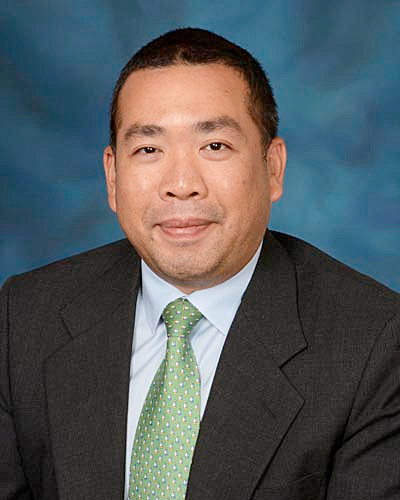$100 Million Grant to Fund HIV Survey in Nigeria
The Institute of Human Virology (IHV) at the University of Maryland School of Medicine (UMSOM) will lead a $100 million project to measure the reach and impact of HIV programs in Nigeria — the largest population-based HIV survey ever conducted in a single country.
"We are pleased that the CDC and the government of Nigeria entrusted us to lead this critical epidemiological study to better understand the state of Nigeria’s current HIV epidemic,” said the study’s principal investigator, Man E. Charurat, PhD, MHS, professor of medicine and director of the Division of Epidemiology and Prevention at IHV. “We look forward to building upon IHV’s 16-year partnership with Nigeria to measure the impact of PEPFAR’s programs in Nigeria and to pave the way towards more effective prevention and treatment."

Man E. Charurat, PhD, MHS
The grant award is the result of a cross-collaboration between IHV’s Division of Epidemiology and Prevention and IHV’s Center for International Health, Education and Biosecurity, led by Deus Bazira, DrPH, MBA, MPH, who also is an assistant professor of medicine.
The work is funded by the U.S. Centers for Disease Control and Prevention (CDC) through the President’s Emergency Plan for AIDS Relief (PEPFAR), in collaboration with the government of Nigeria and the Global Fund to Fight AIDS, Tuberculosis and Malaria, to conduct the Nigeria AIDS Indicator and Impact Survey (NAIIS). IHV will lead the effort to measure the impact of HIV programs on the epidemic in Nigeria. The results of the survey will guide a strategy for Nigeria’s HIV prevention and treatment.
IHV will lead a consortium that includes ICF International, the Institute for Health Metrics and Evaluation at the University of Washington, and the African Field Epidemiology Network, in collaboration with the Nigerian Federal Ministries of Health and the CDC. IHV will receive $30 million in the first year of the multiyear award. Gambo G. Aliyu, MBBS, MS, PhD, project director and assistant professor of epidemiology and public health at IHV, will lead the project on the ground in Nigeria.
"With this new grant, IHV has been awarded close to $1 billion total in PEPFAR funds, a milestone that coincides with PEPFAR’s 15-year anniversary," said Robert C. Gallo, MD, Homer and Martha Gudelsky Distinguished Professor in Medicine and co-founder and director of IHV. Gallo is most widely known for his co-discovery of HIV as the cause of AIDS and for the development of the HIV blood test. He also is co-founder and scientific director of the Global Virus Network (GVN). "We commend President George W. Bush, who signed PEPFAR into law, on this historical global health initiative, which has uniquely put a real dent in the global HIV/AIDS crises. We are also grateful to U.S. leaders for their continued support of PEPFAR."
Gallo continued, “Dr. Charurat and his team are well-positioned to take on this pivotal epidemiological study that encompasses not just HIV, but hepatitis B and C. I am pleased that IHV will continue to work closely with Nigerian colleagues in the fight against HIV and related viruses.”
In the first year, IHV will lead the consortium to survey 88,775 randomly selected households and 168,029 individuals in Nigeria to estimate HIV incidence, prevalence, and viral load suppression among adults and children and to determine hepatitis B and C prevalence. The study spans 37 states in Nigeria and includes training more than 2,900 Nigerians. The work will help inform the CDC and the government of Nigeria on the status of HIV in that country and allow them to more effectively fight the epidemic.
"HIV remains an urgent public health problem in Africa and other parts of the world,” said UMSOM Dean E. Albert Reece, MD, PhD, MBA, executive vice president for medical affairs at the University of Maryland, Baltimore (UMB), and the John Z. and Akiko K. Bowers Distinguished Professor. “IHV has worked relentlessly to save countless lives through both prevention and treatment, and this project will enable them to continue this extremely important work."
Since 2004, through PEPFAR funds, IHV has cared for more than 1.3 million people in Botswana, Ethiopia, Guyana, Haiti, Kenya, Nigeria, Rwanda, South Africa, Tanzania, Uganda, and Zambia.
"IHV’s work represents the highest aspirations of our University, to improve the human condition and serve the public good,” said University of Maryland, Baltimore (UMB) President Jay A. Perman, MD. “Of course, this project is critical to our work in Nigeria, but it will have global impact as well. An unprecedented survey like this will give us invaluable insights into the prevention and treatment of HIV/AIDS around the world and here at home."
About the Institute of Human Virology
Formed in 1996 as a partnership among the state of Maryland, the city of Baltimore, the University System of Maryland, and the University of Maryland Medical System, IHV is an institute of the University of Maryland School of Medicine and home to some of the most globally recognized and world-renowned experts in all of virology. IHV combines the disciplines of basic research, epidemiology, and clinical research in a concerted effort to speed the discovery of diagnostics and therapeutics for a wide variety of chronic and deadly viral and immune disorders — most notably HIV, the virus that causes AIDS. For more information, visit www.ihv.org and follow on Twitter @IHVmaryland.



